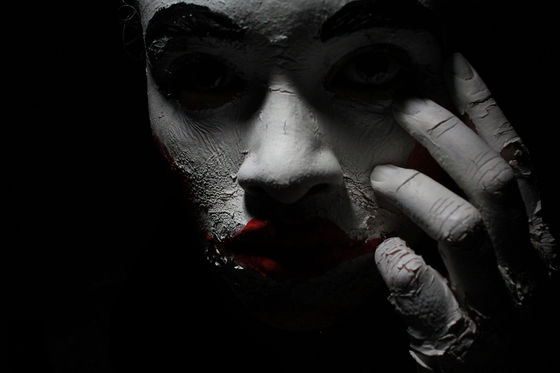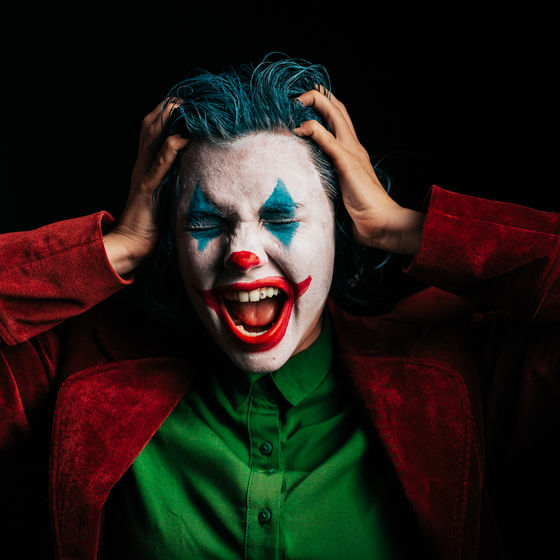``Why are clowns scary?'' Found out in psychological research

Clowns who entertain audiences with their funny makeup and performances are popular at circuses and events, but there are many people with
Frontiers | Fear of clowns: An investigation into the aetiology of coulrophobia
https://doi.org/10.3389/fpsyg.2023.1109466
Why are we so scared of clowns?
https://theconversation.com/why-are-we-so-scared-of-clowns-heres-what-weve-discovered-199352
Philip Tyson, associate professor of psychology at the University of South Wales, who started research on the origins of clown phobia, first evaluated the proportion and severity of people with clown phobia. I worked on the development of the questionnaire (Origins of Fear of Clowns Questionnaire: OFCQ).

The OFCQ created by the research team consisted of 28 descriptions of factors identified in existing literature on clown fear and aversion, and 4 descriptions of common physiological responses to clowns, totaling 32. consists of items. Subjects surveyed by OFCQ responded to a questionnaire that evaluated how much they agreed with each description on a 7-point
When 987 participants aged 18 to 77 who participated in the experiment from 64 countries were surveyed by OFCQ, more than half of the participants, 53.5%, answered that they were 'scary of clowns' above a certain level. In particular, 5% of the respondents answered “very scary”. Interestingly, this 5% percentage is 3.8% for 'animals', 3% for 'blood, injections, injuries', 2.8% for 'high places', 2.3% for 'pool water and weather phenomena', and 'closed places'. 2.2% for ``airplanes'' and 1.3% for ``airplanes'', higher than the rates for many phobias shown in other studies.
We also found that women were more afraid of clowns than men. I don't know why there was a difference between men and women, but this trend is also reported in studies on fears such as snakes and spiders. It was also found that clown phobia decreased with age, which was also consistent with other phobia research results.

The research team then conducted an additional survey of the 53.5% of people who said they were afraid of clowns to identify the causes of their fear of clowns. The following eight descriptions of possible causes of clown phobia were used in this additional investigation:
・I feel creepy and uneasy because clown makeup doesn't look human. I sometimes feel the same way about dolls and mannequins.
・The clown's exaggerated facial features directly evoke a sense of menace.
・Uncertainty arises because clown makeup hides emotional signals.
・The color of the clown's make-up is associated with death, plague, and bloodshed, and evokes feelings of disgust and avoidance.
・The clown's outrageous behavior makes people uncomfortable.
My family taught me my fear of clowns.
Due to the negative portrayal of clowns in popular culture.
・Because I've actually had a scary experience with a clown.
As a result of this follow-up survey, it was found that the last statement, 'I was scared by a clown,' was the least agreeable. This means that fear of clowns is likely not derived from life experience.
On the other hand, the second from the back, 'negative depiction of clowns', acted quite strongly as a factor of clown phobia. As a representative example of the influence of popular culture, the research team found Pennywise, the creepy clown that appears in Stephen King's novel '
However, just as some people are afraid of McDonald's mascot Donald, people with clown phobias are not limited to intentionally terrifyingly painted clowns. So it's natural to think that clowns' appearance hides a more fundamental element that makes people uneasy.
_by_Japanese_Edition.jpg)
by Kotaro Negawa
In fact, follow-up research showed that the strongest factor was that clown makeup masked emotional signals. In other words, it is thought that the biggest reason people feel fear of clowns is that makeup hides the clown's real face, making it difficult to understand the facial expressions. Even if you look at the clown's face, you don't know what he's thinking, and you can't predict what he'll do, so being near a clown makes you feel uneasy.
``This study has provided new insights into why clowns are afraid, but many questions remain,'' said Tyson and colleagues, who conducted the study. For example, if the make-up that hides emotions is what causes fear, does painting the animal's face have the same effect? Or does clown make-up itself have some special factor? The research team will continue further research in order to elucidate the mystery surrounding the fear of clowns.
Related Posts:
in Science, Posted by log1l_ks







